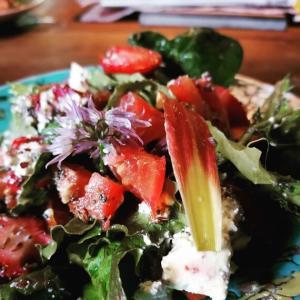The rain is sadly preventing more of our orange daylilies from blossoming, so I probably have to wait to get enough for a meal. My plan for today was to stuff the flowers with our homemade cream cheese, as I do with zucchini- or squash flowers. I was looking forward to them as a pretty apéro snack or entrée. Oh well, that day will come. Soon, I hope. That will also be the day to find out if one of us is allergic to them, as some people seem to react to them with vomiting and diarrhea.
I only recently found out that flowers, leaves and tubers of the pretty orange daylily are edible. Apparently leaves and shoots can be eaten raw or cooked, but only when very young or they become too fibrous. The flower petals may be pulled apart and added to salads or as a gorgeous garnish to any dish.
They can also be added to a stir-fry prior to serving, which will help to retain their color and soften their texture. The plump almost-open flower buds may be dried thoroughly and sealed in an air tight container for re-hydrating in soups or casseroles during the winter months. The dried flowers add a sunny dash of beta-carotene and vitamin C to any dish. If you cook the flower buds and serve them with butter, they are supposed to taste like green beans.
Yesterdays flowers ended up in our salad after all and were much appreciated. They were surprisingly tender and sweet, but that might have also been the strawberries from our garden…
Anyway, no signs of any allergies so far, so daylily-foraging-season is hereby officially opened at Les Pierres.
Flowers, leaves and tubers of the pretty orange daylily
Trying to make ones life sustainable is more than a personal choice and almost automatically leads to a multitude of decisions you have never even thought of before. On this website we share what works for us, or woefully no longer works, obviously without claiming the same for you.
We hope that our journey towards a supplementary comprehensive celebration of nature’s beauty might just clear a pathway forward for you too, perhaps challenges a revealing reconsideration, or simply provides for an equally indispensable diversion.
Can we change the world through food? We believe we can and we support Slow Food, a global movement of local communities and activists across more than 160 countries. Together we defend cultural and biological diversity, promote food education and the transfer of traditional knowledge and skills.


